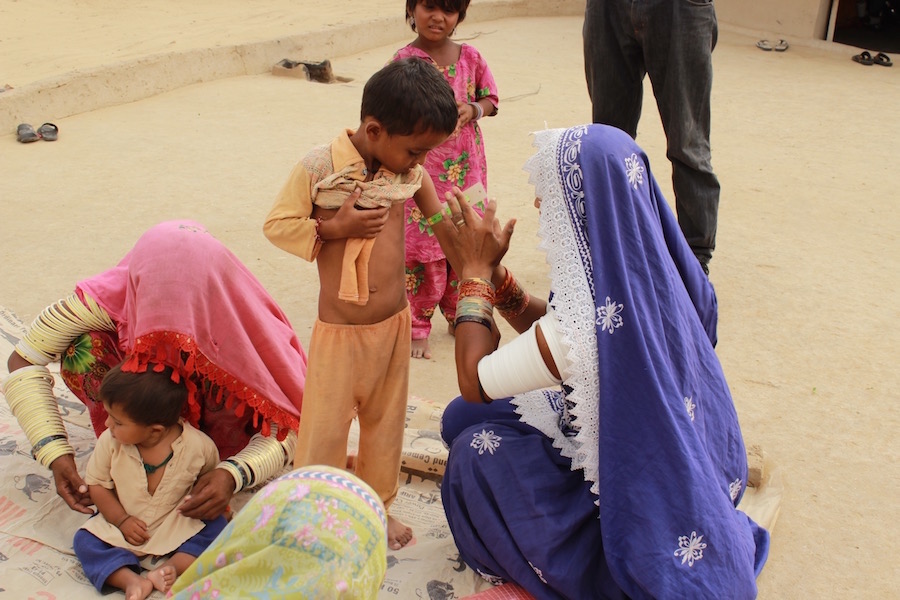In Pakistan, Student Learns ‘What It Takes’.
MPH student Naureen Syed was sitting in a circle of women in the Tharparkar district of Pakistan, holding a cup of Rooh Afza—rose water syrup mixed with water. Syed had gotten sick from contaminated water several times since arriving in Pakistan, she says, “but I couldn’t pour it out because everyone was looking at me. I turned to my boss, and she said, ‘We’re just going to have to drink it.’”
Drinking water safety was one of the many elements of life in this and 72 other villages Syed was evaluating for her practicum with Health and Nutrition Development Society (HANDS) Pakistan, one of the largest NGOs in the country.
Syed assisted with the Misali Project, a yearly evaluation of “Misali” or “model” villages where HANDS has implemented all of its key programs related to social mobilization, water and sanitation, health, education, gender equality, and environmental sustainability. She helped clean, enter, and analyze data from the Misali household survey, and helped her colleagues put together a presentation of the results for the governing board of HANDS.
Working with the data turned out to be a difficult task. “A really big issue during my practicum was missing data,” she says. HANDS was training so many surveyors, she says, and those surveyors were trying to gather so much information, that many data points—and some surveyors—fell through the cracks.
There were also typos in some of the surveys, making data cleaning especially tricky. For example, she says, some surveys lumped together early education and primary education. To tease them apart, Syed says, “We had to put it into context: How old is this person? What is the norm in their family? What is their gender?”
“I never appreciated how hard it is to gather good data,” she says. After working with the survey data, she also made recommendations for how HANDS could improve their data collection.
Still, she says, the evaluation was able to conclude that the programs in the Misali villages were making a difference. Syed and her colleagues found education was improving, with women even attaining higher levels than men. Birthing practices were becoming safer, with more women giving birth in hospitals. There was still work to do for sanitation, but clear improvement. Some vaccination rates were “spotty,” she says, “but their polio vaccinations were on point.”
Beyond getting experience with the work of evaluating development interventions, Syed says she also learned a valuable lesson about global health work: recognize your own ignorance.
That was an especially striking lesson for Syed because her parents are from Pakistan. “When I signed up for this I didn’t realize that I would still experience a cultural barrier,” she says.
Instead, she had trouble communicating—everyone could hear her American accent when she spoke Urdu, and her Pakistani coworkers had to teach her the new slang, instead of the way people spoke when her parents emigrated. “It really frustrated people that I looked like them but I couldn’t talk like them,” she says.
In some of the villages, Syed says she wasn’t able to communicate at all—people there spoke Sindhi or Balochi rather than Urdu. Still, she says, “they welcomed me like I was family. It was really something that I will remember the rest of my life, the way I was treated, the way they just were so excited to meet someone from outside.”
Working in these communities, she says, “really shattered a lot of my view of what villages are like.” Villages can be slow to change, she says, but the women she met truly wanted to do whatever it would take to improve the lives of their families. “If I ever go back to Pakistan that’s the population I want to target, those women.”
She says her practicum has led her to a new interest: contraception. Originally interested in vaccination, Syed says she now sees how contraception touches almost every area of development, opening up education opportunities and helping families allocate their resources. “Family planning is critical to the stability of a nation,” she says.
In two and a half months in Pakistan—sometimes sick, and usually exhausted—Syed says she learned how hard it can be to do this kind of development work. “It was a reality check about what it takes,” she says. She was especially struck by her colleagues: “I really respect how determined they were to make Pakistan a better place.
“They could have left, they could have gone somewhere else, but they’re staying in Pakistan because they want to deal with it. I really admire that strength to stay.”
Back in the circle of women in the village in Tharparkar, Syed says she put aside her fear of getting sick again and drank her Rooh Afza.
“It turned out they had filtered the water and given me some of their best water,” she says. “There was just something about that: They gave me their best.”






